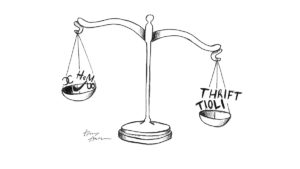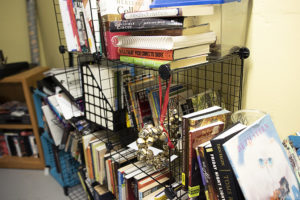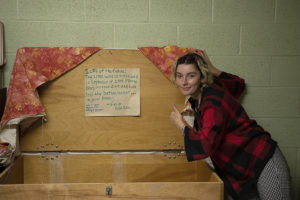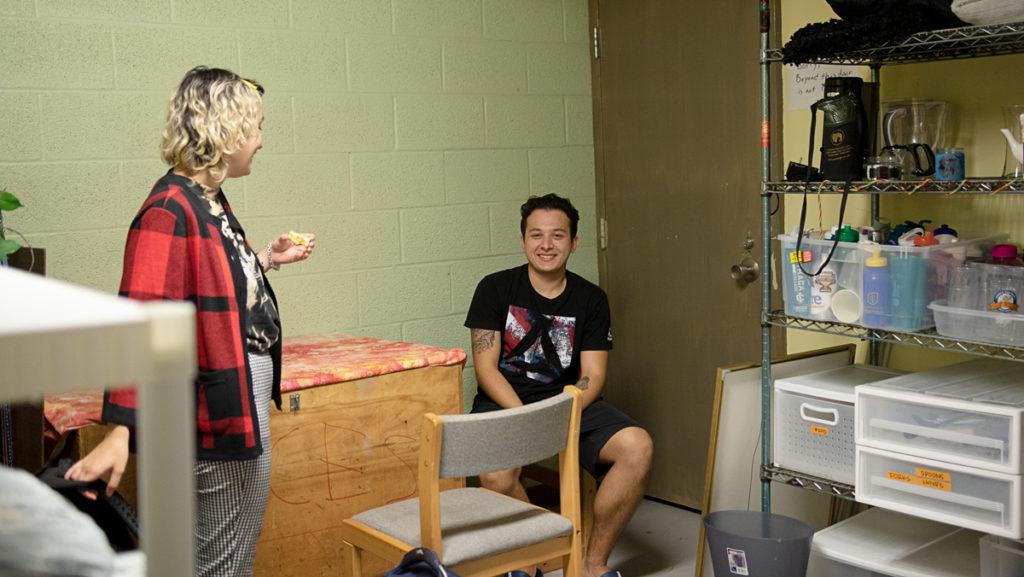Within the basement of Clarke Hall lies a room full of hidden treasures. Used textbooks, CDs, VHS tapes, clothing, kitchenware and even full-length mirrors can be found in the Take It Or Leave It room — commonly known as TIOLI.
TIOLI is Ithaca College’s free thrift store run by Eco-Reps, a group of students employed by the Office of Energy Management and Sustainability. The Eco-Reps program serves as a middle man between the Office of Energy Management and Sustainability and other members of the college community. Eco-Reps educate students about sustainability efforts and encourage the college community to have a positive impact on the environment.
Though TIOLI is open to all members of the college, its hours and location are limited. TIOLI is open every weekday from 12 to 1 p.m. and 4 to 5 p.m. on Mondays, Wednesdays and Fridays.
Junior Gemma Gallucci has been part of the Eco-Reps for two years. They said that although TIOLI has increased in popularity over the years, people don’t realize that they are also helping the environment by taking advantage of this resource.
“It’s not the first thing on everyone’s minds because when people hear about free or cheap things, they believe it affects them personally at that moment,” Gallucci said. “The sustainable and environmentally friendly aspects of TIOLI, and thrifting in general, are just that people who no longer have a need for the things they’re using aren’t throwing it out — they’re donating it so somebody else can use it and at the same time creating less waste that ends up in landfills.”
Approximately 53% of all municipal solid waste (MSW) — which consists of everyday items that are used and thrown away — produced in 2015 ended up in landfills, according to the United States Environmental Protection Agency. Out of that percentage, plastics made up approximately 19% of total waste in landfills, while paper and textiles made up approximately 13% and 8% of total waste in landfills, respectively. Most of the MSW recorded was recyclable materials.

Buying items second-hand has sustainable ramifications. The production of polyester-based clothing and other textiles produces twice as much greenhouse gas as cotton, according to an article published by the World Resources Institute. In 2015 alone, polyester production of textiles resulted in approximately 1.5 trillion pounds worth of greenhouse gases. This figure is the equivalent of the annual emissions made from 185 coal-fired power plants.
Junior Tessie Devlin has also been part of the Eco-Reps for two years and hosts a podcast, “Climate: TBD,” through Eco-Reps. She said people have a hard time understanding their impacts on the environment because they tend to believe that the environment is separate from themselves.
“Everything that humans do affects something else, including other humans,” Devlin said. “It’s challenging for people to understand the implications of them thrifting something versus buying a totally new product. For me, I don’t see the point of buying something new when there is a perfectly usable product already in existence. If someone baked you cookies, you wouldn’t go out and buy the same exact cookies at a grocery store just because someone made those cookies a few hours ago.”

Junior Bryan Robles is a resident assistant in Clarke Hall who has a long history with TIOLI. He said his first interaction with the free thrift store was during his freshman move-in day when he left all of his new clothing hangers at home and needed to find some to use. Once he heard about TIOLI from his RA, he found all the clothing hangers he needed, and since then, he visits TIOLI often to find new items for his dorm. Now, as an RA, he encourages all of his residents to go to TIOLI because of the intriguing items that can be found.
“You really never know what you can get from TIOLI and save some cash that could be used to go eat somewhere or for books,” Robles said. “There are plenty of things college students leave because they are graduating, or they purchase stuff to make their room look better but forget they have no space to store it.”
Robles also said that with programs like TIOLI, people can become more aware of their impacts on the environment and implement sustainable changes in their lives that can help erase their more destructive habits toward nature.
“Cutting down trees in excess without replanting and the emission of fossil fuels into the air are only some things that we as people have done to cause problems for nature and ourselves,” Robles said. “If we don’t take action to take care of our planet, soon it will become irreparable.”
Besides TIOLI, Devlin said there are plenty of other ways people can shop sustainably if they can not find time to visit during the opening hours.
“For shopping in general, don’t purchase something that you would not get its full use out of,” Devlin said. “Even using something small, like bringing your own bag when shopping, can make a huge difference. All of that plastic and paper adds up.”














